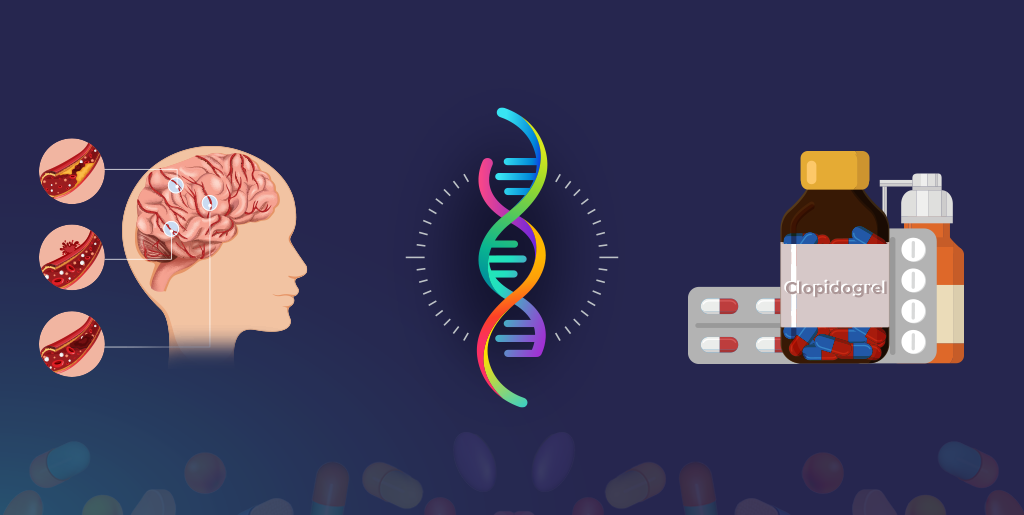Clopidogrel is an antiplatelet drug that helps to reduce the risk of serious cardiovascular thrombotic events such as stroke. In 2020 the state of Hawaii successfully sued the makers of clopidogrel for not disclosing that the drug may not be effective at providing anticoagulation against thrombotic events for some people, particularly those of East Asian and Pacific Island ancestry. The reason for this being a functional mutation in a gene (CYP2C19) that is present in over half of people of Chinese Ancestry 1, making it much more common than in people of European ancestry 2. Data has been limited for other populations though clopidogrel is commonly prescribed throughout the world3. This includes India, where the risk for serious cardiovascular events, including stroke is especially high, with more than a million people affected each year 4,5, making it the 4th leading cause of death and the 5th leading cause of disability in India 6. In terms of disability, in general, 20% of stroke survivors require institutional care after 3 months and 15-30% remain permanently disabled. The probability of a recurrent stroke after the first stroke is as high as 10% in the first month and 14% in the first year 7. The addition of clopidogrel to aspirin for at-risk populations reduces risk of stroke overall by 14-20% and risk of recurrence by 24% 7 and it has been estimated that 23 strokes are prevented per 1000 patients treated with clopidogrel in addition to standard aspirin therapy 8. However, the benefit will only apply if one is not insensitive to the drug. Unfortunately, the first sign of failed efficacy may be death or serious morbidity as the result of a stroke so it is important to identify those for whom alternate treatments should be considered.

This can be done at an individual or population level, thus empirically, an individual of European ancestry is more likely to benefit than one of Chinese ancestry based on the carriage rate of the ineffective gene.
In our work, we found that 38% of the Indians that we screened carried the CYP2C19 *2 or *3 variants, which are the commonest ones responsible for the lack of efficacy of the drug. This carrier rate of these variants was significantly higher than the 20-26% reported in people of European ancestry 9. It is important to note however that one study of patients in India with coronary artery disease treated with clopidogrel did not appear to have less efficacy regardless of genotype 10, raising the possibility of other, as yet unknown, factors that may be involved.
While the incidence is not as high as for those of Chinese ancestry, the genetic risk is nonetheless higher than for people of European ancestry, raising the possibility that testing and further studies on clopidogrel resistance should be considered in people of Indian origin.
References
- Liu G et al., The correlation between recurrent risk and CYP2C19 gene polymorphisms in patients with ischemic stroke treated with clopidogrel for prevention. Medicine (Baltimore). 2020;99(11):e19143.
- McDermott JH, Leach M, Sen D, Smith CJ, Newman WG, Bath PM. The role of CYP2C19 genotyping to guide antiplatelet therapy following ischemic stroke or transient ischemic attack. Expert Rev Clin Pharmacol. 2022 Jul;15(7):811-825. doi: 10.1080/17512433.2022.2108401. Epub 2022 Aug 4. PMID: 35912831; PMCID: PMC9612933.
- Choe JC, Cha KS, Ahn J,et al., Korea Acute Myocardial Infarction Registry–National Institutes of Health Investigators. Comparison of prescription rates and clinical outcomes in acute coronary syndrome patients who underwent percutaneous coronary intervention using different P2Y12 inhibitors in a large observational study. Int J Cardiol. 2019 Jan 1;274:21-26. doi: 10.1016/j.ijcard.2018.09.011. Epub 2018 Sep 5. PMID: 30224257.
- Prabhakaran D, Jeemon P, Roy A. Cardiovascular Diseases in India: Current Epidemiology and Future Directions. Circulation. 2016 Apr 19;133(16):1605-20. doi: 10.1161/CIRCULATIONAHA.114.008729. PMID: 27142605.
- Jones SP, Baqai K, Clegg A, et al. Stroke in India: A systematic review of the incidence, prevalence, and case fatality. Int J Stroke. 2022 Feb;17(2):132-140. doi: 10.1177/17474930211027834. Epub 2021 Jul 2. PMID: 34114912; PMCID: PMC8821978.
- Directorate General of Health Services: Ministry of Health and Family Welfare. National Programme for Prevention and Control of Cancer, Diabetes, Cardiovascular Diseases and Stroke. Government of India 2019, July
- Gouya G, Arrich J, Wolzt M, Huber K, Verheugt FW, Gurbel PA, Pirker-Kees A, Siller-Matula JM. Antiplatelet treatment for prevention of cerebrovascular events in patients with vascular diseases: a systematic review and meta-analysis. Stroke. 2014 Feb;45(2):492-503. doi: 10.1161/STROKEAHA.113.002590. Epub 2013 Dec 24. PMID: 24368560.
- Squizzato A, Bellesini M, Takeda A, Middeldorp S, Donadini MP. Clopidogrel plus aspirin versus aspirin alone for preventing cardiovascular events. Cochrane Database Syst Rev. 2017 Dec 14;12(12):CD005158. doi: 10.1002/14651858.CD005158.pub4. PMID: 29240976; PMCID: PMC6486024.
- Dean L, Kane M. Clopidogrel Therapy and CYP2C19 Genotype. 2012 Mar 8 [updated 2022 Dec 1]. In: Pratt VM, Scott SA, Pirmohamed M, Esquivel B, Kattman BL, Malheiro AJ, editors. Medical Genetics Summaries [Internet]. Bethesda (MD): National Center for Biotechnology Information (US); 2012–. PMID: 28520346.
- Shetkar SS, Ramakrishnan S, Seth S, Chandna P, Verma SK, Bhargava B, Bahl VK. CYP 450 2C19 polymorphisms in Indian patients with coronary artery disease. Indian Heart J. 2014 Jan-Feb;66(1):16-24. doi: 10.1016/j.ihj.2013.10.001. Epub 2013 Nov 6. PMID: 24581091
